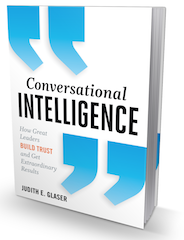
by Judith E. Glaser
Human beings have a need to belong that is now considered by neuroscientists and psychologists to be more powerful than the need for physical safety and security. When we feel we are rejected from our tribe, as when we feel we don't fit in or are embarrassed in front of others, we often choose to go into "radio silence" rather than openly and honestly address those feelings.
Sadly, many organizations operate in a perpetual state of distrust and fear, where people don't feel they can speak their truth to each other.
Case in point: A 2002 Golin-Harris survey found that 69 percent of respondents agreed with the statement, "I just don't know who to trust anymore." A fearful state of mind alters how we see and experience reality, how we interact with others, and how much we are willing to engage, innovate, and speak our mind.
When trust is absent, we see REALITY with threatened eyes, and we:
• Reveal less than what we know or what is helpful to move forward
• Expect more than what is possible
• Assume the worst in others
• Look at situations with caution
• Interpret communications with fear
• Tell secrets we promised not to tell
• Yes people to avoid confronting truth
When we are in a state of distrust, the world feels threatening. Threats make us retreat. They make us feel we need to protect. We are more sensitive to feeling wrong, or feeling embarrassed, and we behave differently.
Neuroscientists say that high levels of threat give us an "Amygdala Hijack," which is when fear networks are activated in our brains and we "fight, flee, freeze, or appease others."
Here are 7 Universal Threats that give us an Amygdala Hijack:
•Tone threat--judgmental or angry tone is felt as a threat to our ego
•Hurt threat--threat to our physical safety
•Risk and punishment threat--taking risks, fear of failure or making mistakes
•Exclusion threat--looking stupid in front of others and being ostracized
•Anger threat--fear of someone's potential anger toward us, and not knowing how to respond
•Territory threat--having our territory limited or diminished, or people encroaching on our territory
•Status threat--challenge to our status, or making us feel small.
Conversational Intelligence™ & the Neuroscience of Trust
Our level of trust is changed, in many cases, by the way we share information, i.e., through conversations. Conversations trigger physical and emotional changes in our brains and bodies through altering the amounts of two of the most powerful hormones that affect social interaction: oxytocin, which enables bonding and collaboration, and testosterone, which enables our aggressive behaviors.
Conversational Intelligence™ Neuro-tip #2: According to Angelika Dimoka, Ph.D., Temple University, "The brain is where trust lives or dies. Distrust takes place in the lower brain (the Amygdala and Limbic areas) and trust takes place in the higher brain (Prefrontal Cortex)."
Conversational Intelligence™ Neuro-tip #3: Bruce S. McEwen, Ph.D., professor and head of the Laboratory of Neuro-endocrinology at The Rockefeller University, states, "Trust is a phenomenon that is enhanced by oxytocin, which gets people to be socially interactive. Then you have the Amygdala, which is the sentinel along with the Prefrontal Cortex, paying attention to decide if the interaction is going to be rewarding or punishing. If the inter-action is punishing we feel more aggressive and distrustful. We have to be wary and we move into protect behaviors." Under stress, testosterone levels are increased.
If the interaction feels good, you have more oxytocin and you relax. Testosterone works against oxytocin as does cortisol, another powerful hormone that is increased by stress. It's the balance between these hormones and the neural systems they interact with that gives us the feelings of trust or distrust.
Judith E. Glaser is CEO of Benchmark Communications, Inc. and Chairman of The Creating WE Institute. She is an Organizational Anthropologist, and consults to Fortune 500 Companies. Judith is the author of four best selling business books, including her newest Conversational Intelligence: How Great Leaders Build Trust and Get Extraordinary Results (Bibliomotion, 2013) Visit www.conversationalingelligence.com; www.creatingwe.com; jeglaser@creatingwe.com or call 212-307-4386.
